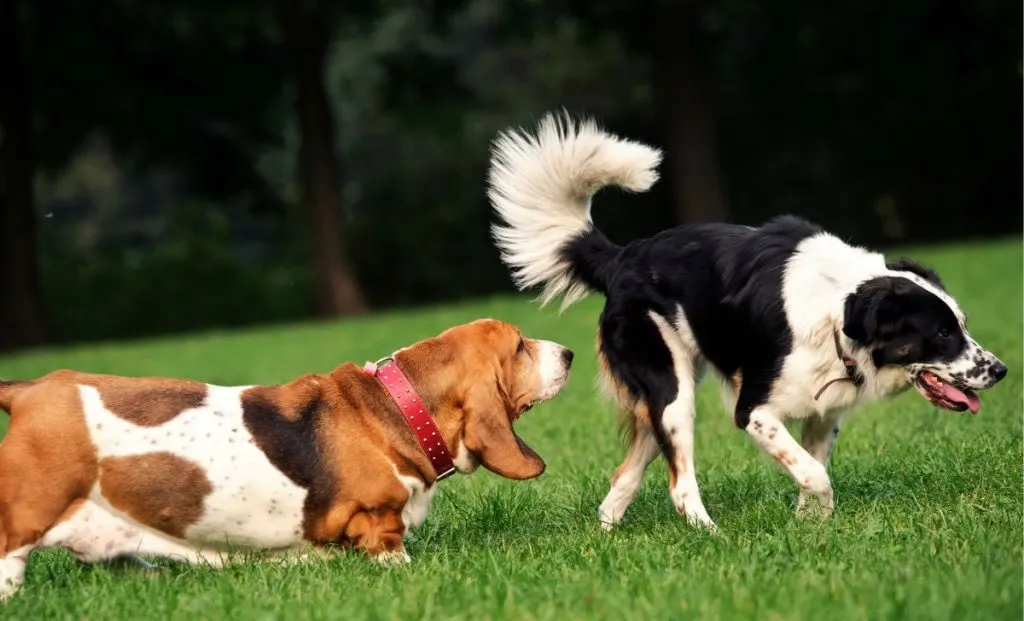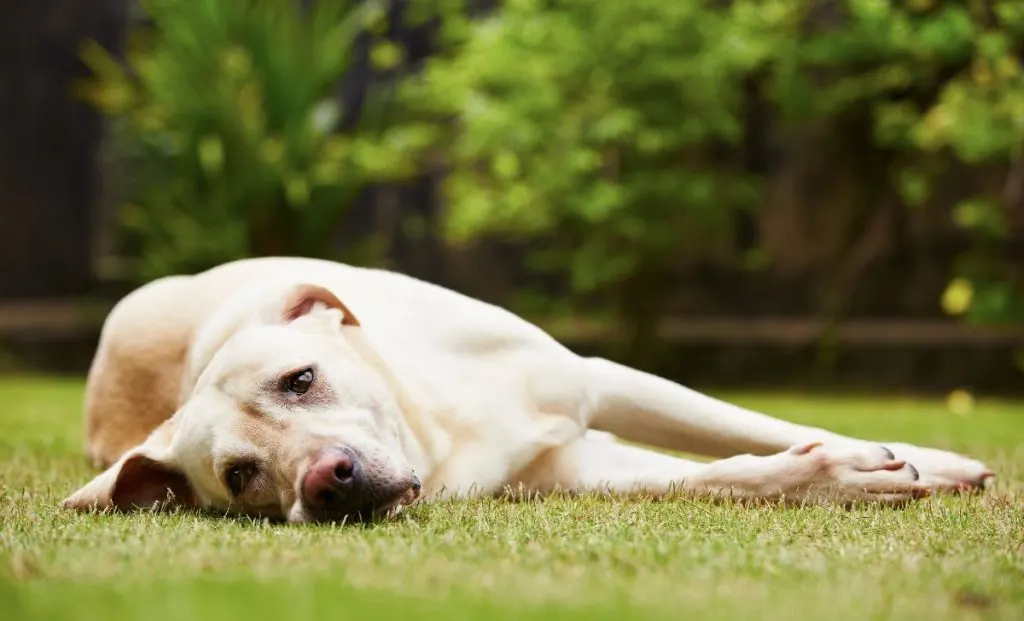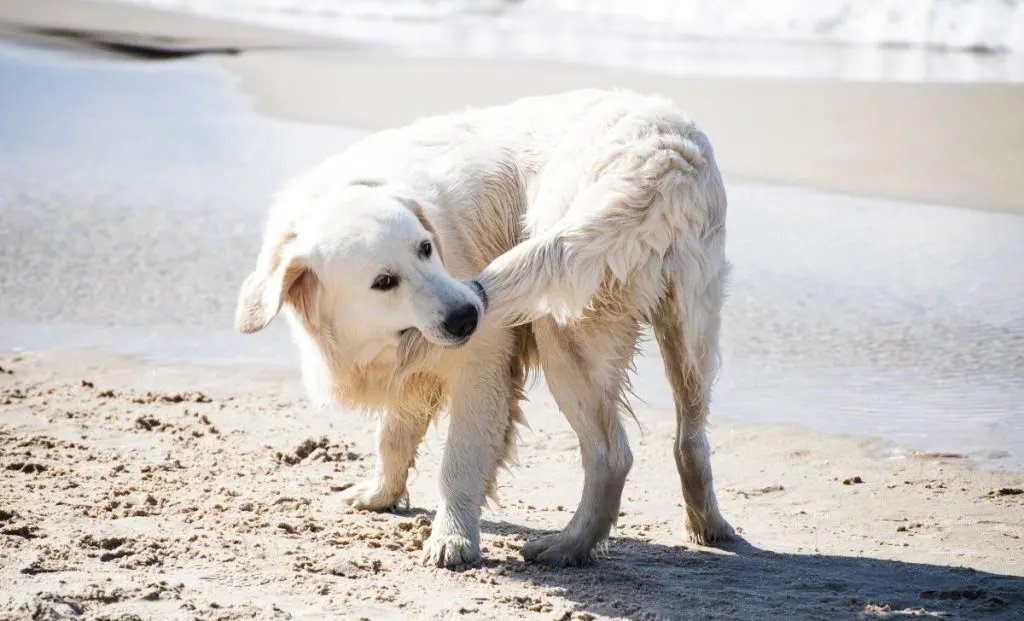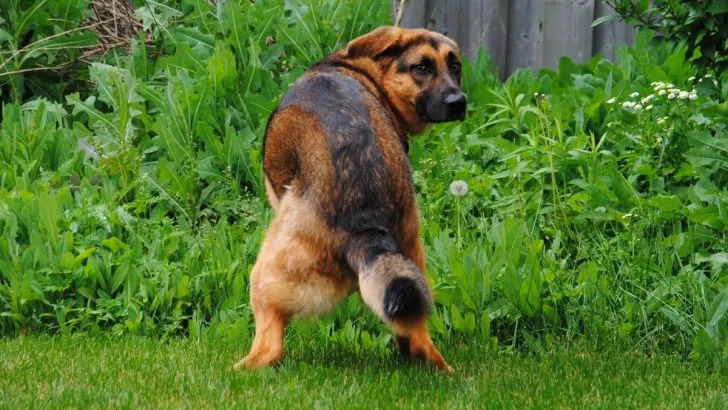If you’ve ever taken your dog for a walk in the park or observed them in your backyard, you may have noticed something they do after their business.
They often engage in a series of little kicks or scratches with their back legs, immediately after they finish pooping.
So, why do dogs kick after they poop?
This seemingly peculiar behavior has sparked countless questions and theories among dog lovers and experts alike.
I’ve got good news for you!
In this article, we will delve into the ins and outs of this kind of behavior. Let’s uncover the reasons behind why dogs kick after they poop!
1. A Form Of Communication
Popular theory suggests that the most common reason dogs kick after they poop, is actually to spread their scent and mark their territory using their hind feet.
In the animal kingdom, scent marking plays a crucial role in communication, allowing dogs to convey important messages to other canines in the area or to be aware of the presence of other dogs.
By leaving their mark through kicking and scratching, dogs are essentially saying, “I was here.”
2. Scent Making

One of the primary reasons dogs kick after pooping is to leave behind a scent trail that communicates their presence to other animals.
By mixing the scent of their urine and feces with the earth, dogs create a unique chemical reaction that acts as a territorial marker. I mean, feces and urine itself produce a strong smell in the first place.
This dog scrape behavior is essential in the natural world to establish dominance and ward off potential predators.
So, by engaging in this behavior, dogs’ body languages are not only communicating with other canines but also asserting their presence and status within their environment.
3. Camouflaging their Waste
Another school of thought proposes that the kicking behavior is a remnant of wild dog ancestry.
In the wild, ancestral dogs would kick up dirt and grass after eliminating to cover their scent and hide their presence from potential predators.
While our domestic dogs may not face the same threats as their wild counterparts. This basic instinct behavior remains deeply ingrained in their DNA.
4. Exhibiting Pack Behaviour
Psychology Today published “Ground Scratching by Dogs: Scent, Sight, and Ecstasy” by animal behavior expert, Marc Bekoff Ph.D.
In this research, Bekoff suggests that dogs may kick after pooping to further enhance the scent of urine, making it more potent and long-lasting.
This enhanced scent marking serves as a clear sign to other dogs in the area, providing valuable information about the individual dog’s presence and territory boundaries.
This behavior may also strengthen the feeling of unity within the pack. Each dog’s scent can contribute to a collective signature that symbolizes their togetherness and territorial presence.
5. Cleaning After Themselves
Alongside the aspects of territory marking and displaying dominance, there’s also a theory that dogs might be engaging in this kicking behavior as a way of cleaning after themselves.
I’m not entirely sure if that’s the case, though. I mean, the idea of dogs kicking after their business to “clean up” in their own way is definitely amusing.
So, before you start thinking dogs are turning into neat freaks like their feline counterparts, it’s important to note that their idea of ‘cleaning up’ is more about spreading their personal brand than actually tidying up.
In the end, they are driven by instinctive behaviors tied to communication and territory rather than an actual intention to clean.
The Science Behind Dog Kicking Behavior

The exact reasons behind why dogs kick after they poop may vary. However, there are several scientific explanations that might give us some really interesting answers!
Let’s take a look, shall we?
Influence Of Canine Genetics
The fascinating ground scratching behavior observed in dogs can find its roots deeply embedded in their genetics and breed-specific traits, influenced by their ancestors and the wider Canidae family.
For example, scent marking (a critical component of this behavior), has been extensively documented in wolves, the close relatives of domestic dogs.
This ancestral practice plays a huge role in key areas such as territorial defense, reproduction signaling, and fostering social cohesion within packs.
With that being said, we can conclude that this connection to their wild counterparts highlights a genetic predisposition towards such behaviors.
Adding to this, studies on other wild dog family members, like African wild dogs and Ethiopian wolves, show they also use scent marking to talk to each other in really detailed ways, even between different groups.
This tells us that, when dogs scratch the ground after going to the bathroom, this may be something deep in their nature, not just something they learn.
It’s a natural behavior for many kinds of wild dogs, not just our pets.
Muscle Spasms And Degenerative Joint Disease
One possible explanation for dog kicking behavior is related to muscle spasms and joint health.
Dogs, especially older ones, may experience muscle stiffness or discomfort after taking the squatting position to poop.
The act of kicking helps alleviate this discomfort and allows them to stretch and exercise their hind legs.
Muscle Spasms
A dog experiencing a muscle spasm will frequently exhibit twitches or tremors in a specific area of their body.
These are typically detectable by touch in addition to being seen.
Muscle spasms are usually a reaction to another ailment or injury. Your dog may also show other symptoms, depending on what caused it and how severe the injury is:
- Exhibiting symptoms of depression
- Vocalization and whimpering
- Displaying irritability
- Being restless
- Experiencing muscle tightness
- Showing reluctance to use a limb
- Adopting an odd stance
Degenerative Joint Disease
Degenerative joint disease (DJD) is the term used to describe osteoarthritis or arthritis that arises from the progressive loss of articular cartilage in one or more joints.
The most prominent symptom of canine joint disease (DJD) is lameness.
However, dogs can exhibit a variety of additional symptoms in addition to limping that point to arthritic discomfort, such as:
- Walking slower
- Peeing while walking
- Pooping while walking
- Lying down more often
- Sleeping more than usual
- Lethargic and not interested in walks/playtime
- Stretching their legs while sitting down
- Difficulty getting up
- Lethargy
- Difficulty getting into the car
- Unusual posture; head and tail down
- Trouble going upstairs/downstairs
If you notice any of these symptoms start to show, you should call your veterinarian for a regular checkup. Just to be safe.
Hip Dysplasia And Joint Pain
Another health issue that is linked to your dog kicking after they poop could be hip dysplasia.
Canine hip dysplasia (CHD) is a polygenic and multifactorial developmental disorder characterized by coxofemoral (hip) joint laxity, degeneration, and osteoarthritis (OA).
In other words, it is a complex condition that affects dogs, caused by a combination of genes and other factors.
It leads to looseness in the hip joints, which can get worse over time and result in arthritis, making it painful for the dog to move around.
Current diagnostic techniques are largely subjective measures of joint confirmation performed at different stages of development.
Here are some of the symptoms to look out for :
- Tightness in their hind limbs
- A decline in thigh muscle mass
- Reduced interest
- Reluctance to move or climb stairs
- Hypertrophy of shoulder muscles as a result of adjusting for hip pain
Boerboels, being a large and heavily muscled breed, are particularly susceptible to hip dysplasia. Especially if proper breeding practices are not followed to screen for and minimize the risk of passing on predisposing factors.
Responsible breeding, regular exercise to maintain muscle tone, and proper nutrition can help mitigate the risk of hip dysplasia in Boerboels and other large breeds.
For dogs suffering from hip dysplasia or other joint issues, kicking after pooping can provide relief from pain and discomfort.
By engaging their hind legs in this motion, dogs may be able to release tension in their joints and muscles.
Nerve Damage And Sensory Stimulation
If your dog starts kicking their back legs unexpectedly, it might be a sign of something wrong, like nerve damage.
Dogs have sensitive nerve endings in their paws that can get damaged, just like humans.
That said, if you see your dog making these unusual movements, it’s a good idea to visit the vet to check on their health.
On the other paw, the act of kicking against the ground provides sensory stimulation and feedback.
This sensory experience may be pleasurable for dogs and serve as a form of self-soothing or stress relief.
They also tend to engage in paw licking or biting. It’s natural for owners to wonder about the reasons behind this behavior.
In many cases it can indeed be a sign of relief.
But sometimes they do it to soothe irritation, itchiness, or discomfort caused by allergies, skin infections, or minor injuries.
Why Do Dogs Circle Before They Poop?

There is more weird stuff dogs do when it comes to pooping.
Before dogs get down to business, they often do a little pre-poop dance, twirling around in circles. It seems like it is an important part of their poop-cycle.
This silly routine, which comes before any rolling, kicking, or the yuckier habit of poop-eating, is their way of getting the job done just right.
By walking in circles, they can assess the area and determine if it meets their criteria for a suitable bathroom location, such as privacy or the absence of potential threats.
Circling may also help dogs align their body in the ideal position for defecation.
Lastly, circling can stimulate the dog’s digestive system and encourage bowel movement. This natural movement can help start the elimination process and make it more efficient.
Overall, circling before pooping is a natural behavior for dogs that serves multiple purposes.
It’s a normal part of their bathroom routine and shouldn’t typically be a cause for concern.
Why Do Dogs Run After They Poop?
Running after pooping is another typically harmless and natural behavior for dogs. It’s more of a sign of their vitality and enjoyment, rather than a cause for concern.
You see, after eliminating waste, dogs may feel a burst of energy and excitement. This makes them run or engage in other playful behaviors.
This energy release is what we like to call the post-poop zoomies!
Aside from excitement, running after pooping could be an expression of this satisfaction or relief.
Dogs have natural instincts that drive their behaviors, and running after pooping could be an instinctual response rooted in their evolutionary past.
In the wild, moving away from their waste area could help reduce the risk of detection by predators or competitors.
Why Does My Dog Run To Me After He Poops?
Your dog might do a happy dance or take a little run around after they go to the bathroom, looking super pleased with themselves.
They often come back to you with tails wagging, looking for some praise or a pat. I mean, they did a good job, right?
In these moments, the dog’s happiness is palpable, contagious even.
The other day I saw my neighbor Chow Chow completing her bathroom duties and came bouncing back to him like crazy. It seems that she follows him everywhere, especially after duty!
Should I Stop My Dog From Kicking After Pooping?
While kicking after pooping is natural, it’s not some sort of aggressive behavior. It doesn’t necessarily require intervention. So, generally, no, you do not have to stop them from doing this.
However, there are a few situations where owners may want to consider stepping in:
Destructive Behavior
When dogs get a bit too enthusiastic with their kicking and it turns into excessive digging, it can leave your yard looking quite bad. Not to mention the possible burn marks or damage to your lovely landscaping.
It’s important for pet owners to step in and guide their furry friend’s energy in a more constructive direction.
One way to do this is by finding different activities that can help use up all that pent-up energy.
This could include more walks, playtime with their favorite toys, or even setting up a special digging spot where it’s okay to go wild.
Health Concerns
If a dog has issues with its hips or hind legs, such as hip dysplasia, kicking too much after going to the bathroom could make these problems worse.
This is because the kicking motion can put extra strain on already weak or painful areas.
Excessive dog scraping or scooting after pooping could be a sign of discomfort or irritation, such as impacted anal glands or allergies.
If a dog exhibits other signs of discomfort or if the behavior is accompanied by licking or biting at the rear end, it’s advisable to consult with a veterinarian.
How Do I Get My Dog To Stop Kicking After Pooping?
Getting your dog to stop kicking after they do their business might seem tough, but don’t worry!
With a bit of patience and sticking to your plan, you can definitely help them swap this habit for something less troublesome.
I must warn you though, you may not be successful in stopping this behavior completely. Afterall, they have it rooted in them!
What you can do is, rather than trying to stop your dog from kicking after pooping altogether, focus on encouraging incompatible behaviors which distract them from doing this particular deed.
For example, positive reinforcement training can help redirect unwanted behaviors and encourage more desirable ones. Since you are here, dog ground scratching is probably an unwanted behavior for you.
Next, providing toys, puzzles, and other forms of mental and physical stimulation can help satisfy your dog’s natural instincts. This may reduce the likelihood of destructive behavior.
Lastly, ensuring that your pup receives adequate exercise and playtime can help prevent boredom and reduce the need for excessive kicking or digging.
The Importance Of Observation
Next time you take your furry companion for a walk in the park or visit the dog park, pay close attention to their post-poop rituals.
In some cases, the kicking behavior may also be a way for dogs to interact with their human companions.
It may be a playful gesture involving dogs kicking their hind legs in response to being petted or scratched in a particular way.
Do not be surprised if you see other forms of behavior alongside their post-poop ritual.
One other form of that might strike us as baffling behavior is rolling in poop. Although it seems a bit nasty it serves almost the same purpose as kicking. For them it’s a ritual just like any other.
The Final Scoop On Poop Kicks
The question of “why do dogs kick after they poop” might seem like it could lead down a complex rabbit hole, but it’s actually more straightforward than we might initially think.
Pet kicks after pooping are truly interesting to see. Such behavior groups a range of physical, social, and psychological factors.
As pet parents, we are privileged to share our lives with these loyal and loving creatures.
Our dogs bring us joy, companionship, and endless entertainment with their unique personalities and behaviors.
By taking the time to understand and appreciate why dogs kick after they poop, we can deepen our bond with our furry companions and create a relationship based on trust and mutual respect.
Remember that every dog is unique, and understanding their individual traits and habits is key to building a strong and trusting bond!

Meet Iram, a devoted veterinarian, passionate dog lover, and current Ph.D. candidate at Utrecht University in the Netherlands. Seamlessly blending her roles as a vet and content writer, Iram channels her love for dogs into heartfelt narratives.
Since childhood, Iram nurtured a dream of becoming a vet, a passion that runs deep in her family. Having now fulfilled that dream, she’s eager to share her acquired knowledge. In her writing, Iram not only explores the emotional bond between humans and their canine friends but also integrates her veterinary expertise, offering readers a holistic understanding of their beloved pets.
